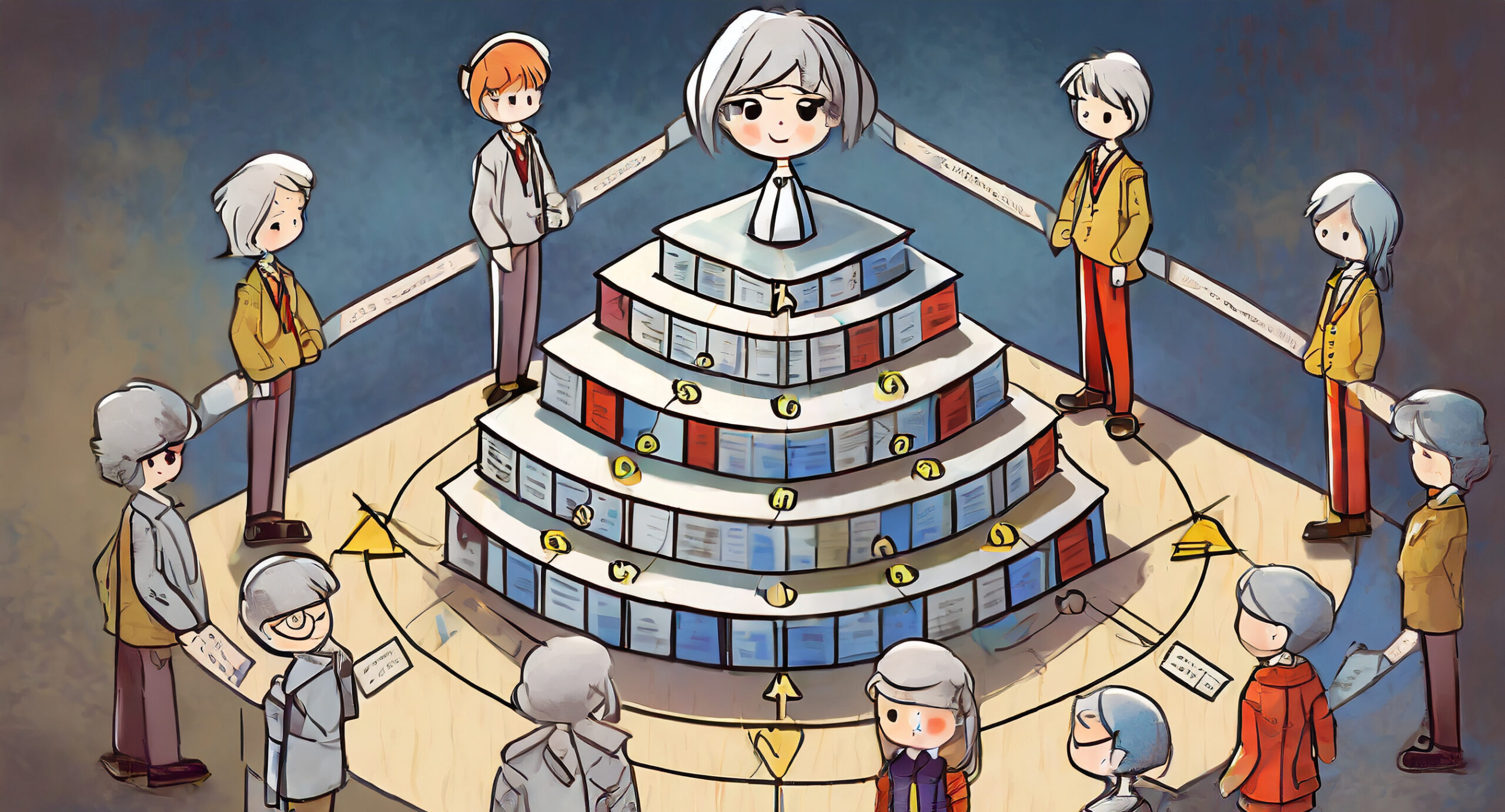Brief history of the Korean hierarchy

During the Silla dynasty (57 BC), Korean society started to change; they divided the citizens according to the following status: royalty, commoners, enslaved people and outcasts. The new hierarchical social structure, inspired by Confucianism, required the Korean language to adapt, and that is when the levels of formality in speech emerged, implying Koreans to address people differently. At that moment, to be respectful, they needed to be aware of their own status and the others, too, changing their mental and behaviours. Since 1984, the class system has been abolished, but Confucianism persists in how organizations are structured and how people perceive each other and communicate.
Hierarchical structure

In South Korea, many organizations follow a hierarchical structure, meaning that the vertical concentration of decision-making is at the senior levels of management, and the horizontal one is at staff department levels for functional control. So, with such disparity in power, Korean society has a high power distance of 60, according to Hofstede’s framework. It is also seen in Koreans’ behaviour, where they deeply respect hierarchy and do not contest nor question power inequality.
According to my readings, Korea has a score of 85 in uncertainty avoidance, and such a characteristic in the workplace is seen as people respecting decision-making, strict rules, and directives to follow the organizational and social order present in Confucianism. Such top-down decisions and rules are made in a directive leadership style; in other words, employees must execute their manager’s demands.
Challenges & Solutions
For you expatriates, such a solid hierarchical culture can be difficult to digest because, depending on your cultural background, you might be used to sharing your opinion, arguing on a position, or even making suggestions to your senior when you think about a ‘better’ idea. Such a conversation would be nearly impossible in Korea because you must follow the rules of hierarchy and directives no matter what; otherwise, you would disrespect your superiors and disturb the social order Koreans are accustomed to.
Here are some tips for you to adapt and be respectful through the hierarchical environment:
- Mimic the way your colleagues act (e.g. you would realize that they bow to show respect)
- Talk to your colleagues to know who your seniors are
- Do not be afraid of vulnerability, of making mistakes; assume them and apologize; people will usually understand that you are trying to adapt to their culture to the best of your abilities
- Be mindful of your status within Korean society when you act and speak, and many problems will be solved
Who has the power in a hierarchical structure?

In South Korea, seniority and age determine someone’s status and power. A senior is usually someone over 45 who makes the decision; no senior in a meeting, no decision made. To maintain such a degree of superiority, “Korean managers cherish good interpersonal relationships with their subordinates and try to keep the needs and feelings… of subordinates in mind.” (Morden, T., 1998). By conversing this way, superiors try to maintain inhwa (harmony) and develop relationships with their subordinates, imitating Confucianist practices, where harmonious teamwork and hierarchy lead to tremendous success, proven by Korea’s 20th-century economic growth. The subordinate main job is to show respect to their seniors; that is why, as portrayed in kdramas, employees cannot leave the office before their seniors; otherwise, it would be perceived as insulting and disloyal.
*Note that factors such as your family background and education might have significance when attributing promotions.
Challenges & Solutions
In a managerial position, you must know your power and how the employees will treat you. Depending on your previous work experience, you might feel discomfort. Still, it would be best to meet your employees’ expectations by:
- Giving directives
- Leading conversations
- Asking questions for them to speak up
- Using polite titles
- Not being too informal
Of course, there is no “official guidance” on how to be a Korean-like manager because everyone is unique, but just be mindful of how it works there by using your cultural intelligence.
Try to do the following:
- Gain knowledge by reading articles and apply it to real-life situations and learn from others’ reactions
- Look at what your colleagues are doing and imitate them
- Go to Itaewon, the expatriates’ district, to ask questions
- Try to converse openly with your employees
Having a conversation as simple as if you have a last-minute meeting and need to work extra hours but feel guilty about your colleagues waiting for you to leave, just explain your situation and reassure them that they can go whenever they want to. It allows them to choose and feel unpressured to stay.
Is there gender inequality in senior positions and employment?

Yes, there is gender inequality in senior positions and employment. Men occupy most higher-up positions, but the mental is changing as Korea becomes more globalized and modern. Historically, Korea has been a military-oriented country where men are responsible for protecting the land. Still today, men aged between 18 and 35 must do 21 to 36 months of military service. Therefore, the Korean government encourages men to contribute to society by becoming soldiers and enterprise leaders, too.
By putting such an emphasis on men’s roles, women’s roles are minimized; women should take care of the family and not steal the men’s jobs because the men should sacrifice themselves for the country. So, “Women suffer from the biased judgement of society that they are not competent enough to do men’s jobs,” leading them to a lack of job opportunities and recognition (Ma, 2021). However, more women are taking place in the job market nowadays, but many elders, so seniors, still have such a mentality and treat their female employees accordingly. Consequently, generational conflicts occur; on one side, people are inconsiderate of the women’s workload of family roles and tell men to work, and on the other side, some complain about the “unwillingness of some male citizens to sacrifice their personal life and non-patriarchal characteristics.” (Ma, 2021)
Challenges & Solutions
If you are a woman expatriate, you might discover that your salary is lower than your male colleagues and that your seniors undervalue your ideas and performance. Besides talking about it to your female colleagues for solidarity and actively participating in movements, it does not seem like there is anything to do in the workplace other than accept the situation. South Korea is a competitive country with few job offers for its citizens. So, for instance, it is often better to search for job opportunities but keep working silently because little money is better than being replaced and having nothing. Again, I reiterate that not all companies operate with such gender inequality, but it happens. If so, go back to thinking about why you are there and the life-changing experience you gain by being exposed to diversity, search for your company’s values and policies and look at expatriates’ Facebook groups to ask about their work experiences.
What communication style is used in Korean hierarchical workplaces?

Nowadays, there are four different levels of speech to convey a message in the Korean language. These levels are used to show respect to others, which follows Confucianism’s hierarchical and humble values of treating people according to their status. Choosing the appropriate honorifics during a conversation depends on your status differences, degree of intimacy and the formality of the situation. To know such information, Koreans often ask about someone’s age and what they do for a living or give each other’s business cards with two hands to know who they are talking to. However, in the workplace, every company has their own level of formality. In my research, some companies used job titles to address each other, others used friendly honorifics like “oppa,” which means older brother to women, and others used the first name. Therefore, it is a “case by case” situation regarding which honorifics to use.
Regarding hierarchy, lower employees are expected to be obedient to promote harmony within a group in a meeting. Therefore, often, subordinates are silent to respect their senior’s opinions and directives. Concerning orders, seniors often use high-context communication, meaning that workers need to “do what they think” according to their knowledge because instruction will not be explicitly explained. In a situation of confusion, Koreans tend not to ask questions to their manager and nod because otherwise, it would be against the Confucian face-saving value. Indeed, asking questions implicitly means that the manager was not clear enough, which would humiliate them.
On a similar note, humour must be used with precaution. Usually, humour is seen as a communicational style that could diminish the power distance between superiors and subordinates with its friendly and unprofessional characteristics, which is unfavourable in Confucianism because it disturbs hierarchy. Younger people might use it with each other, which could benefit the working environment, but it could feel awkward between elders and younger people. If the elders make an inappropriate or unfunny joke, the subordinate must laugh for the senior to keep his dignity, which creates an uncomfortable dynamic.
Challenges & Solutions
For expatriates, levels of speech can be challenging to use but can be solved by learning basic Korean and imitating others. Using the first name and job title is often appropriate in any workplace because being “too formal” is okay. In the worst scenario, they will tell you, “Oh, but you could call me Oppa!” for instance. An excellent way to practice would be to watch Korean TV shows and analyze how formality is differently used depending on the settings and the people Koreans are talking to. Also, try not to feel offended by someone asking your age; remind yourself that it is a cultural question and that you should ask it if you want to address people adequately.
As a manager, when you give directives, remember that a nod does not necessarily mean “I understood” because it is a polite formality norm in Korea. Ask questions to your employees to ensure comprehension, and even if the culture is high-context, you could give explicit instructions because you do not yet share a similar cultural background and understanding. If you want them to ask you questions or share their ideas, persistently give them opportunities to speak up; create an open conversational workplace. Ways to do so could be to:
- Ask them questions
- Implement a question period after meetings
- Try anonymous surveys
- Ask them to join you in events to create a relationship
When it comes to humour, it is suggested that you do not use it frequently.
To evaluate whether a joke is appropriate:
- Observe your surroundings
- Get to know the culture and typical daily conversations
- Deeply analyze the situation you are facing
- Try to use substitution; based on your knowledge, put yourself in their shoes
References
(2023). Military Service in Korea – Serving the Country. 90 Day Korean. https://www.90daykorean.com/military-service-in-korea/
Al-Alawi, A., & Alkhodari, H. J. (2016). Cross-cultural differences in managing businesses: applying Hofstede cultural analysis in Germany, Canada, South Korea and Morocco. Elixir International Business Management, 95(2016), 40855-40861.
Bader, A. K., Froese, F. J., and Kraeh, A. (2018). Clash of Cultures? German Expatriates’ Work-Life Boundary Adjustment in South Korea. European Management Review, 15: 357–374. https://doi-org.proxy3.library.mcgill.ca/10.1111/emre.12102.
CHAE, Seo-Young. (n.d.). Understanding the Korean Language. Asia Society. https://asiasociety.org/korea/understanding-korean-language
CHAI, Yoon-tae. (2023). South Korea shown to have highest gender pay gap in OECD. Hankyoreh. https://english.hani.co.kr/arti/english_edition/e_national/1095587.html
Kim HS & Plester BA. (2019). Harmony and Distress: Humor, Culture, and Psychological Well-Being in South Korean Organizations. Front. Psychol. 9:2643. doi: 10.3389/fpsyg.2018.02643
Kim, H., & Hamilton-Hart, N. (2022). Negotiating and contesting Confucian workplace culture in South Korea. Asian Studies Review, 46(1), 110–129.
Kim, Y. S. (2008). Communication experiences of American expatriates in South Korea: A study of cross-cultural adaptation. Human Communication, 11(4), 511–528.
Ma, G., Yang, C., Qin, Z. & Guo, M. (2021). Hegemonic Masculinity in East Asia: China, South Korea and Japan, Atlantis Press, 10.2991/assehr.k.211220.416
Morden, T. and Bowles, D. (1998). Management in South Korea: a review, Management Decision, Vol. 36 No. 5, pp. 316-330. https://doi.org/10.1108/00251749810220522
Self, R., Self, D. R., & Bell-Haynes, J. (2011). Intercultural Human Resource Management: South Korea And The United States. International Journal of Management & Information Systems (IJMIS), 15(1). https://doi.org/10.19030/ijmis.v15i1.1594
